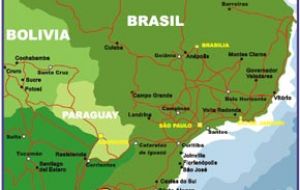MercoPress. South Atlantic News Agency
World Bank forecasts Uruguayan economy growth of 0.8% in 2009
 Uruguay’s neighbours Argentina and Brazil have a tough year ahead with contraction and a return to modest growth in 2010.
Uruguay’s neighbours Argentina and Brazil have a tough year ahead with contraction and a return to modest growth in 2010. The World Bank estimates the Uruguayan economy will expand 0.8% this year and begin a gradual recovery in 2010 with growth reaching 2.3%. In spite of the poor 2009 estimate, it will be one of the highest of the region together with Peru, Panama, Bolivia, Belize and Guyana.
For 2011, the World Bank is forecasting 3.4% growth. Last year the Uruguayan economy advanced almost 9% following five years of sustained expansion.
The current account deficit is expected to moderate this year to 1.8% of GDP (compared to 3.8% in 2008) and will again rebound in 2010 and 2011 to 2.2% and 2.4% of GDP.
Regarding regional economies the World Bank forecasts Brazil to contract 1.1% in 2009 but will recover in 2010 with 2.5% growth. Argentina’s economy is expected to fall 1.5% this year and bounce back 1.9% in 2010.
On Monday the World Bank warned that the world is entering an era of slower growth that will require tighter and more effective oversight of the financial system.
Developing countries are expected to grow by only 1.2% this year, after 8.1% growth in 2007 and 5.9% growth in 2008. When China and India are excluded, GDP in the remaining developing countries is projected to fall by 1.6%, causing continued job losses and throwing more people into poverty.
Global growth is also expected to be negative, with an expected 2.9% contraction of global GDP in 2009. The forecast is for Latinamerica’s economy to decline 2.3% and reach 2% in 2010.
Global GDP growth is expected to rebound 2% in 2010 and 3.2% by 2011. In developing countries higher growth is expected at 4.4 % in 2010 and 5.7 % in 2011.
However much will depend on how deep and prolonged recession is in the developed countries. In spite of sound fundamentals, Latinamerica is feeling the crisis in part because of falling commodity prices, but also on the financial side as foreign funds were withdrawn quickly. Flexible exchange rates in many countries in the region were able to absorb much of the initial shock and avoid systemic problems even as equity markets tumbled.




Top Comments
Disclaimer & comment rulesCommenting for this story is now closed.
If you have a Facebook account, become a fan and comment on our Facebook Page!